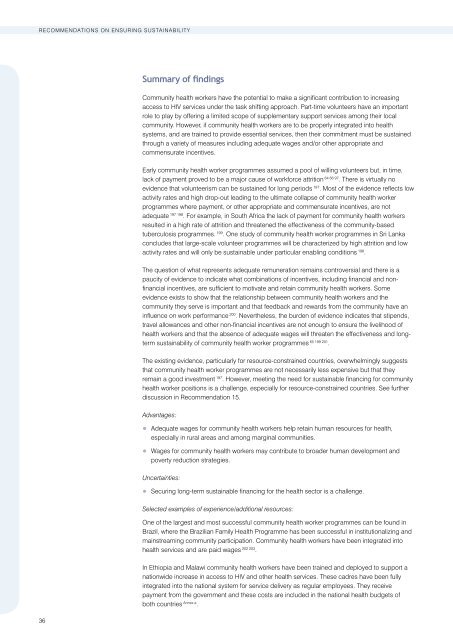Task Shifting - Global Recommendations and Guidelines - unaids
Task Shifting - Global Recommendations and Guidelines - unaids
Task Shifting - Global Recommendations and Guidelines - unaids
Create successful ePaper yourself
Turn your PDF publications into a flip-book with our unique Google optimized e-Paper software.
<strong>Recommendations</strong> on ensuring sustainability<br />
Summary of findings<br />
Community health workers have the potential to make a significant contribution to increasing<br />
access to HIV services under the task shifting approach. Part-time volunteers have an important<br />
role to play by offering a limited scope of supplementary support services among their local<br />
community. However, if community health workers are to be properly integrated into health<br />
systems, <strong>and</strong> are trained to provide essential services, then their commitment must be sustained<br />
through a variety of measures including adequate wages <strong>and</strong>/or other appropriate <strong>and</strong><br />
commensurate incentives.<br />
Early community health worker programmes assumed a pool of willing volunteers but, in time,<br />
lack of payment proved to be a major cause of workforce attrition 64 66 97 . There is virtually no<br />
evidence that volunteerism can be sustained for long periods 197 . Most of the evidence reflects low<br />
activity rates <strong>and</strong> high drop-out leading to the ultimate collapse of community health worker<br />
programmes where payment, or other appropriate <strong>and</strong> commensurate incentives, are not<br />
adequate 197 198 . For example, in South Africa the lack of payment for community health workers<br />
resulted in a high rate of attrition <strong>and</strong> threatened the effectiveness of the community-based<br />
tuberculosis programmes. 199 . One study of community health worker programmes in Sri Lanka<br />
concludes that large-scale volunteer programmes will be characterized by high attrition <strong>and</strong> low<br />
activity rates <strong>and</strong> will only be sustainable under particular enabling conditions 198 .<br />
The question of what represents adequate remuneration remains controversial <strong>and</strong> there is a<br />
paucity of evidence to indicate what combinations of incentives, including financial <strong>and</strong> nonfinancial<br />
incentives, are sufficient to motivate <strong>and</strong> retain community health workers. Some<br />
evidence exists to show that the relationship between community health workers <strong>and</strong> the<br />
community they serve is important <strong>and</strong> that feedback <strong>and</strong> rewards from the community have an<br />
influence on work performance 200 . Nevertheless, the burden of evidence indicates that stipends,<br />
travel allowances <strong>and</strong> other non-financial incentives are not enough to ensure the livelihood of<br />
health workers <strong>and</strong> that the absence of adequate wages will threaten the effectiveness <strong>and</strong> longterm<br />
sustainability of community health worker programmes 65 199 201 .<br />
The existing evidence, particularly for resource-constrained countries, overwhelmingly suggests<br />
that community health worker programmes are not necessarily less expensive but that they<br />
remain a good investment 197 . However, meeting the need for sustainable financing for community<br />
health worker positions is a challenge, especially for resource-constrained countries. See further<br />
discussion in Recommendation 15.<br />
Advantages:<br />
• Adequate wages for community health workers help retain human resources for health,<br />
especially in rural areas <strong>and</strong> among marginal communities.<br />
• Wages for community health workers may contribute to broader human development <strong>and</strong><br />
poverty reduction strategies.<br />
Uncertainties:<br />
• Securing long-term sustainable financing for the health sector is a challenge.<br />
Selected examples of experience/additional resources:<br />
One of the largest <strong>and</strong> most successful community health worker programmes can be found in<br />
Brazil, where the Brazilian Family Health Programme has been successful in institutionalizing <strong>and</strong><br />
mainstreaming community participation. Community health workers have been integrated into<br />
health services <strong>and</strong> are paid wages 202 203 .<br />
36<br />
In Ethiopia <strong>and</strong> Malawi community health workers have been trained <strong>and</strong> deployed to support a<br />
nationwide increase in access to HIV <strong>and</strong> other health services. These cadres have been fully<br />
integrated into the national system for service delivery as regular employees. They receive<br />
payment from the government <strong>and</strong> these costs are included in the national health budgets of<br />
both countries Annex a .

















